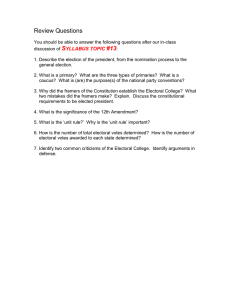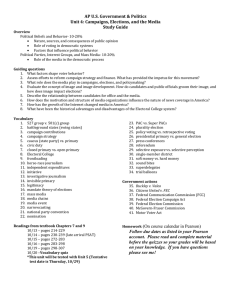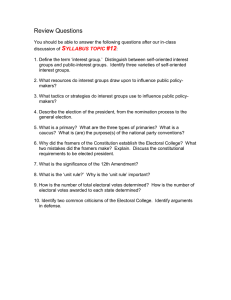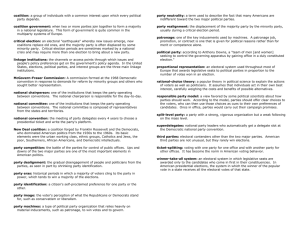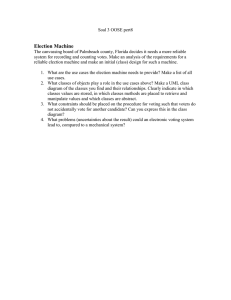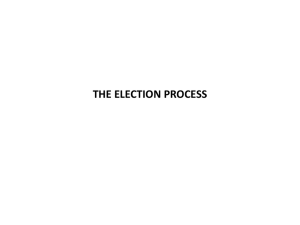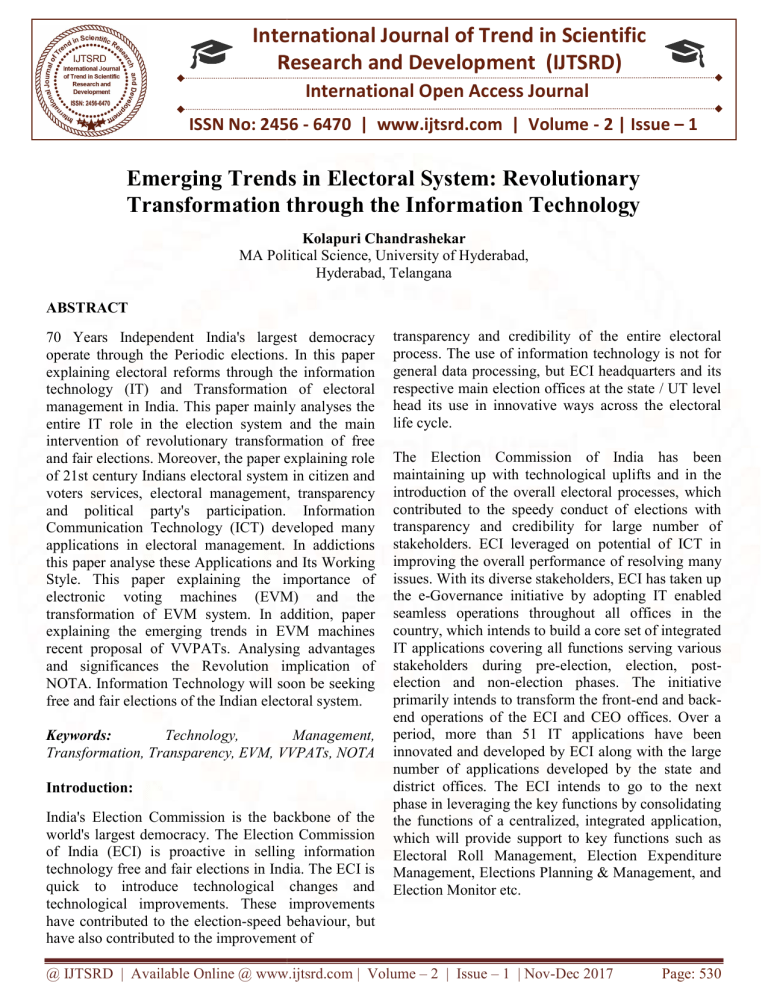
International Journal of Trend in Scientific
Research and Development (IJTSRD)
International Open Access Journal
ISSN No: 2456 - 6470 | www.ijtsrd.com | Volume - 2 | Issue – 1
Emerging Trends in Electoral System: Revolutionary
Transformation through the Information Technology
Kolapuri Chandrashekar
MA Political Science, University of Hyderabad,
Hyderabad, Telangana
ABSTRACT
70 Years Independent India's largest democracy
operate through the Periodic elections. In this paper
explaining electoral reforms through the information
technology (IT) and Transformation of electoral
management in India. This paper mainly analyses the
entire IT role
ole in the election system and the main
intervention of revolutionary transformation of free
and fair elections. Moreover, the paper explaining role
of 21st century Indians electoral system in citizen and
voters services, electoral management, transparency
and political party's participation. Information
Communication Technology (ICT) developed many
applications in electoral management. In addictions
this paper analyse these Applications
ications and Its Working
Style. This paper explaining the importance of
electronic
nic voting machines (EVM) and the
transformation of EVM system. In addition, paper
explaining the emerging trends in EVM machines
recent proposal of VVPATs. Analysing advantages
and significances the Revolution implication of
NOTA. Information Technology will
ill soon be seeking
free and fair elections of the Indian electoral system.
Keywords:
Technology,
Management,
Transformation, Transparency, EVM, VVPATs
VVPATs, NOTA
Introduction:
India's Election Commission is the backbone of the
world's largest democracy. The Election Commission
of India (ECI) is proactive in selling information
technology free and fair elections in India. The ECI is
quick to introduce technological changes and
technological
chnological improvements. These improvements
have contributed to the election-speed
speed behaviour, but
have also contributed to the improvement of
transparency and credibility of the entire electoral
process. The use of information technology is not for
general data processing, but ECI headquarters and its
respective main election offices at the state / UT level
head its use in innovative ways across the electoral
life cycle.
The Election Commission of India has been
maintaining up with technological uplifts
upl
and in the
introduction of the overall electoral processes, which
contributed to the speedy conduct of elections with
transparency and credibility for large number of
stakeholders. ECI leveraged on potential of ICT in
improving the overall performance of resolving many
issues. With its diverse stakeholders, ECI has taken up
the e-Governance
Governance initiative by adopting IT enabled
seamless operations throughout all offices in the
country, which intends to build a core set of integrated
IT applications covering
g all functions serving various
stakeholders during pre-election,
election, election, postpost
election and non-election
election phases. The initiative
primarily intends to transform the front-end
front
and backend operations of the ECI and CEO offices. Over a
period, more than 51 IT
T applications have been
innovated and developed by ECI along with the large
number of applications developed by the state and
district offices. The ECI intends to go to the next
phase in leveraging the key functions by consolidating
the functions of a centralized,
tralized, integrated application,
which will provide support to key functions such as
Electoral Roll Management, Election Expenditure
Management, Elections Planning & Management, and
Election Monitor etc.
@ IJTSRD | Available Online @ www.ijtsrd.com | Volume – 2 | Issue – 1 | Nov-Dec
Dec 2017
Page: 530
International Journal of Trend in Scientific Research and Development (IJTSRD) ISSN: 2456-6470
Electoral system transformation through ICT
The Election Commission of India has developed
several applications in the Election Management and
Non-Corruption Electoral System.
The 51
applications for transparency of the electoral system
developed in ECI. This paper is dived into four parts.
Citizens, second monitoring, third information and
last political parties. These four are providing with
centric service.
1. Citizens/ Voters:
Electoral portal-100% availability throughout the
year and running without hacking
National voters service –Voter name searching
national wide. Apply for registration, correction,
modification. View details of Polling Booths,
Assembly Constituencies, and Parliamentary
constituencies. Get contact details of Booth Level
and other officials. Get a link to websites of states
/ UTs View audio-visual films to get educated
about election processes, polling processes, use of
EVM etc.
National grievance service – Complete G to C
interface for providing seamless services to submit
grievance by citizens. Provides single window
common interface to the citizens for submitting
their complaints. The system forwards the
complaints to the appropriate authority and keeps
the user informed about its progress. Call centre
services are integrated. All submitted grievances
are monitored at the higher level. The complainant
can monitor the progress of the status and track
the status. SMS based information system for
communicating with the complainant and the
officials responsible for resolution. Analysis on
complaints registered for election process
improvement. Facility of accepting images and
video along with complaints filed.
Polling stations –Location with google map. It is
a web-based module to help users find their
polling station location on Google map. Google
map is available as service and is gaining a
popularity now. The names of election officials
(CEOs, DEOs, EROs, and BLOs along with their
mobile numbers) are also displayed for polling
booths. The electoral roll in pdf format of State /
UT has also linked with them.
E- Rolls in pdf – Go to www.nvsp.in and select
"search your name on the election roll". Fill out
the given form and click on "View your election
officers" next click on "e-roll”.
Voter’s Educations – Voter Education Channel is
Educating new Voters and Giving Information on
election processes. In addition to educating use of
EVM & VVPAT.
Results – Election Results & Statistics An
analysis of the trends and results on counting day.
Also, create Round wise schedule data, Round
wise votes polled against each candidate. In
addition, facilitate postal ballot votes polled
against each candidate. Numbers, bar charts, and
pie charts declare last results. Various Report
Provided.
2. Electoral Management:
ERMS – The ERMS (Electoral Roll Management
System) will cover the entire process of Electoral
Roll preparation for the State from the Electoral
Roll Revision data management to the final
electoral roll publishing. A cluster of window/web
based applications. Covers entire process from
draft roll preparation, roll revision, registration,
and correction and data modification to electors
Photo Identity Card (EPIC). Following tools such
as Search Facility, Voter Slip generation (Online /
Mobile), and Tracking status of the submitted
application. Format 1 to 8 reporting module,
Database
Error
finding
module
and
Rationalizations of Polling Station etc.
EVM Tracking Application - Centralized
database for CU and BU's distributed across all
over India. CEO / DEO / Warehouse In-charge /
ECI Admin Levels / BEL / ECIL. Allows
Tracking of CU / BU / VVPAT and their location.
Create and enter the warehouse details and CU /
BU / VVPAT stock. Transfer of Units once
entered do not require re-entry and keeps check of
duplicate entry of units in all the warehouses
across the country.
Candidate
Nomination
and
Affidavit
Management System- Capturing candidate's
election statutory information and publishing it for
dissemination. Capture and display candidate's
affidavits. Submission of nomination & ballot
@ IJTSRD | Available Online @ www.ijtsrd.com | Volume – 2 | Issue – 1 | Nov-Dec 2017
Page: 531
International Journal of Trend in Scientific Research and Development (IJTSRD) ISSN: 2456-6470
papers. Controlled data entry through exception
reporting.
Observers Portal- To view and capture the
information of Observer. Deployment status can
also be seen easily. Observers can upload various
types of reports on the ECI server. The notice
board is available where an observer can see that
there is a commission sends any notification to
him. Observers can see the files uploaded by them
on the portal. They can view the last deployment
status or other information/reports uploaded by
them.
Election Expenditure Monitoring - Monitor
Candidate total expenses. The political party gives
monitor Funds to the candidate. Others give
monitor Funds to the candidate. Monitor Expense
understated or not. Monitor Candidate expenses
exceed ceiling amount or not. EEMS Dashboard
with graphs, charts and MIS analysis reports.
Election monitoring Dashboards- Pre-poll, Pollday, Post-Poll. Trends and Result. Consolidation
(post-poll statistical analysis). GIS Map based
Reports using SSRS. Interactive drill down and
drill through reports. Android Mobile App for
sending information in real time. Predefine SMS
Format for collection information. Alert system
using Push / Pull SMS Technology. Find the exact
location on Google Map if the incident happens.
Poll Day Monitoring System- Poll Day
Monitoring reports can be submitted via Mobile or
through Web. Higher mobile penetration benefits
managing time schedules. Help on the compilation
for decision-making. Helps in populating
decisions taken to a large number of concerned
officials working in the field. Provides a
mechanism of smart governance of elections
3. Transparency:
ECI playing a crucial role in transparency in
information sharing through the ICT
Webcasting - Trends and Result Dissemination.
Open source based Framework for webcasting.
Check on untoward activities and help to bring
about complete transparency. Live broadcast.
Used for awareness to the users.
Trends and Result Dissemination- For trends
and results dissemination during and after
counting an application has been provided at all
the counting centers on counting day. Round wise
schedule data round wise votes polled against
each candidate for all rounds. Postal ballot votes
polled against each candidate are entered and time
to time trends and results are declared through
numbers, bar charts and pie charts ( for the
graphical view). The various report is provided for
monitoring progress of data entry.
Candidate Nomination Details
Candidate Affidavit Details
Candidate List of Political Parties and Election
Symbols- Constitutions of Political Parties.
Recognition & De-recognition of parties. Dispute,
Merger etc. Contribution & Expenditure Reports.
Annual Audit Reports. Transparency Guidelines
& Current Instructions and Political Parties
expenditure Details.
4. Candidates & Political Parties
Candidates Affidavits submission system Candidates can file affidavits online along with
nomination forms. Assets and liabilities of
candidates can be monitored properly with ease.
Easy to publish on web and social media.
Political parties’ registration system-Political
Party and Free Symbol Update Application. For
Inserting and Distribution of New Parties and
Elements Identical Details. Candidate.
Expenditure Submission System-Facility for
candidates to file their Abstract Statement of
Election Expenditure online. Details of
expenditure and source of funds are captured for
further analysis. Candidates can easily register
themselves through election commission website
& file expenditure details.
Vehicle Requisition System-Vehicle management
system for issuance of vehicle requisition.
Capturing of the vehicle details with the address
and the number of bank details from one district to
another district etc.
Meeting/Rallies Permission Requisition SystemA single window system for Candidates and
@ IJTSRD | Available Online @ www.ijtsrd.com | Volume – 2 | Issue – 1 | Nov-Dec 2017
Page: 532
International Journal of Trend in Scientific Research and Development (IJTSRD) ISSN: 2456-6470
political parties to apply for permissions
(meetings, rallies, vehicles, temporary election
office, loudspeakers, helicopters etc.). Facilities
applying, processing, granting and monitoring
permissions
Dynamic change electoral system EVM
EVM or Electronic voting machines are used to vote
without disclosing your identity. It is used in the
Indian General and State Elections. It replaced paper
ballots in the general elections in the local, state and
India. The EC announced that all the electoral
environments enabled by the Voter Verified Paper
Audit Trail (VVPAT). EC has sanctioned Rs 3,174
crore for purchase of 16, 15,000 VVPATs. Check out
the life cycle and safety features of the machine here
Advantages of EVMs
The introduction of EVM resulted in substantial cost
reduction, which eliminated the need for production
and printing of ballot papers. These machines save
nearly 10,000 tonnes of ballot paper (200,000 trees) in
every national election. A substantial reduction in
expenditure comes when it comes to transport,
storage, and counting staff. The main progress to the
voting calculation process is to make results in 2 to 3
hours against 30-40 hours in the ballot paper system.
A large number of EVMs have received substantial
assistance in the country where the voter struggles to
vote in the electoral ballot system. EVMs in the
movie, all they need to do is press the button against
the candidate of their choice and enter their vote.
These machines also reduced the possibility of bogus
voting.
Criticism of EVMs
Although the Election Commission has conducted the
EVMs as one of the most depressing voting machines
in the world, the security flaws in these machines
have been brought back and forth. Many security
analysts have rejected EVMs 'fraud.' The 'criticism' by
the commission rejected the argument, the challenge
of the machine was challenged by many. Promoting
EVMs encouraged American scientists to develop a
technique to hack into these machines. The BJP leader
Subramanian Swamy later called for an investigation
into the safety and security of EVMs.
Voter verifiable paper audit trails (VVPATs)
The Election Commission has allocated Rs 3,174
crore to buy 16.15 lakh electoral certificates in the
2019 Lok Sabha polls. During this time, the 2017
Assembly elections will be debated on EVMs
(electronic voting machines).
Background
EVMs were first used in Kerala Assembly elections in
1982, but it was the first time in the 1992 Lok Sabha
elections. EVMS voting system simplified. This has
led to a serious decline in electoral fraud, including
rigging and stuffing of ballot boxes. VVPATS is used
in certain constituencies to verify EVMs with a paper
trail. Election Commission vs SubrahmanyaSwamy,
2013, Supreme Court VVPAT is directed to the EC to
introduce "Free and Fair Election Mandatory" and
phase-wise VVPAT.
Advantages
The VVPAT machine additionally allows EVM
results to be cross-checked by a paper audit,
completing
another
layer
of
independent
manufacturers. It serves as an additional barrier to
change or destroy votes.
NOTA (none of the above)
NOTA is an option in the list of candidates in an
electronic voting machine (EVM). If a voter is not
satisfied with candidates nominated by political
parties in an election, their dissatisfaction can be
entered through the NOTA. This is a negative voting
form. NOTA is an expression of the secret right. It is
also part of Article -19 (Freedom of Expression and
Speech). This is not a right but a right to refuse.
Background
In 2001, Secretary to the Election Commission of
India addressed a letter to the Ministry of Law and
Justice to correct the serious shortcomings for the
right to refuse the right to refuse. However, no action
was taken. People's Union for Civil Liberties. In the
Supreme Court of the Union of India judgment, the
provisions of the Election Code of 1961 (41), 41 (3)
& 49 (O) Create an awareness on the above (NOTA)
and the electronic voting machine (EVMs). Adverse
voting in the Indian parliament is a frequent choice.
@ IJTSRD | Available Online @ www.ijtsrd.com | Volume – 2 | Issue – 1 | Nov-Dec 2017
Page: 533
International Journal of Trend in Scientific Research and Development (IJTSRD) ISSN: 2456-6470
Significance
REFERENCE:
It helps to maintain the secret of valid votes. Negative
voting encourages people who are not satisfied with
any of the candidates who have expressed their
request and turned up to reject all contestants. This
will help prevent voucher voting in the name of voters
who have voted to record their protest. The nominal
number of nota votes that emphasize political parties
to nominate candidates.
1. ICT 2025 - Vision Document by ECI
Conclusion:
4. IT & Automation division election commission of
India
Indian electoral system facing this problem before the
electoral management system. After ICT, the ECI will
have full electoral management. When information
technology is not in the electoral system, such rigging
and counterfeit voting problems arise. In the electoral
system ICT is coming into the largest democratic
system of EVM machines introduced by many
changes. The electoral system is likely to go to every
polling station.The NOTA recognizes the correct
principle of rejecting India's first term as a revolution
in the Indian electoral system and the PUCL of the
Supreme Court of India has supported the PUCL. This
"no judgment" in the 2014 elections and the choice of
several state elections held since passing this verdict.
Without IT, Developed countries are free and fair
elections cannot be imagined.
2. Eciection commission of india official web site
http://eci.nic.in/m/home.html
3. EVMs : Securing Fair and Free Elections by
Shubhojit on September 19, 2014
http://www.elections.in/political-corner/evmssecuring-fair-and-free-elections/
5. Nota in India: An Electoral Renaissance? By
ApurvaPrabhakar
6. What is an EVM? How does
http://indianexpress.com/article
@ IJTSRD | Available Online @ www.ijtsrd.com | Volume – 2 | Issue – 1 | Nov-Dec 2017
it
work?
Page: 534

